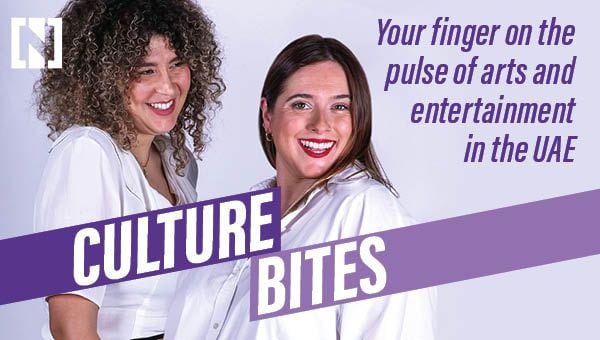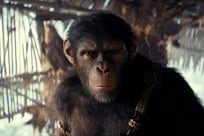
Welcome to the latest edition of The Arts Edit, the weekly newsletter from The National's Abu Dhabi newsroom rounding up this week's most noteworthy arts and culture stories.
IN FOCUS
The 77th Cannes Film Festival, the most globally significant event in cinema, commences today, and for filmmakers from the region it’s a moment of both elation and disappointment.
While there is a strong selection of Arab film overall, as well as at least one major milestone, the situation in Gaza does feel marginalised from the main conversations. Significantly, no Palestinian filmmakers are represented in the official segments of the event.
Mena filmmakers have been an integral part of the festival since the Cannes event first took place in 1946, when Egypt had a prominent role in proceedings. And ever since, the event has remained integral to Arab cinema's emergence on the global stage.
And, probably more than any other industry event, the festival has been a key platform for political viewpoints. That is part of its very DNA, as the event was ideated as an alternative to the Venice Film Festival during Mussolini’s rule, for political reasons.
The festival’s significance from a political perspective was made starkly clear again last week when the Iranian filmmaker Mohammad Rasoulof, whose film is set to screen this year, was sentenced to eight years in prison, compelling him to flee the country.

That makes the lack of a Palestinian artist’s perspective concerning, especially as the tragedy in Gaza is in its eighth month, and reaction to this humanitarian crisis has reshaped the political and cultural landscape globally.
The only official film ostensibly about Gaza, a special screening out of competition, is by a French filmmaker and from its description does not centre the Palestinian perspective. Outside the festival, a new film by Palestinian director Mahdi Fleifel will be screening only in an unofficial capacity during a parallel event in town.
Razmig Bedirian has written more in depth about that situation here.
There are, however, many positives worth celebrating for Arab film overall. This year features the first movie from the Arabian Gulf in the festival’s official selection, with Saudi Arabia’s Norah to screen in the Un Certain Regard section.
That’s a remarkable achievement for Saudi Arabia, which began supporting the development of a home-grown film industry only six years ago, announcing those intentions at the 2018 event.

And across the official festival and on the sidelines, there is a wealth of films by some of the region’s most celebrated filmmakers as well as some emerging voices set to screen, which you can read about in Maan Jalal’s round-up here.
India is well represented, too, with the premiere of a number of films made outside the Bollywood system set to be screened. Read more about that from David Tusing here.
How exactly Palestine will fit into the conversation on the ground remains to be seen, though we will be keeping a close eye on any and all developments on that front as the festival continues.
Photographers struggle to reveal life as it's lived in Gaza and West Bank
The photographers presenting their work at this year's Slidefest Palestine event in London offered a strongly worded rebuke to western media outlets about the photojournalism they commission in Gaza and the occupied West Bank,writes Melissa Gronlund.
Dubai’s Gulf Photo Plus launched the event on Wednesday at the University of Greenwich’s Stephen Lawrence Gallery, focusing on photographers from or working in Palestine: Tanya Habjouqa, Maen Hammad, PhotoKegham/Ozge Calafato, Samar Hazboun and Rehaf Batniji.
Habjouqa and Hammad, who shoot individual projects and freelance for western media outlets, spoke to Melissa about the problems of media access and misrepresentation across Palestine.
Foreign reporters, as well as those from the West Bank, are effectively banned from Gaza. The images published in the media are mostly from local photographers, or stringers for newswires such as AP and Reuters. But Habjouqa, who lives in East Jerusalem, says some media outlets have been shying away from using their work recently.

“I am extremely frustrated by the access to photographers in Gaza,” she says. “Many US outlets are not hiring because of what they call the ‘duty of care’ – they do not want to be responsible if something happens.”
Foreign media are allowed in the West Bank but coverage of the territory is often not a priority for media outlets. Israel is also seen to be actively containing the narratives emerging from Palestine. It shut down Al Jazeera’s Palestinian bureau last week, raiding its East Jerusalem offices, and the Israeli military often stages press events.
“Foreign journalists fly into Ramallah and events are frequently misrepresented,” says Hammad, who splits his time between Washington DC and Ramallah. “But my role is not to take a photo and leave. I’m part of this community.”
Why people are blocking celebrities on social media
Social media users across platforms have created a digital movement to block celebrities who have been silent on social issues, including the Israel-Gaza war, writes Maan Jalal.
Operation blockout, also known as the "digital guillotine", has gained momentum in the past week, after the Met Gala took place in New York City with a host of A-list names in attendance.
The abundance seen on the red carpet has been highlighted by many social media users, comparing it to the devastation in Gaza, particularly in the light of the military offensive on Rafah.

“There’s a massive #Blockout2024 taking place where we block every celebrity that hasn’t spoken up about Palestine or called for a ceasefire. It’s a global movement,” Bahraini poet Karim Wafa-Al Hussaini wrote on X.
“They live off of our attention. If they don’t have any, they cease to exert their influence.”
Using the hashtags #celebrityblocklist, #letthemeatcake and #blockout, online users are listing the names of celebrities who attended the Met Gala, or have a large following and cultural influence, who haven’t spoken out about the events in Gaza, suggesting they should be blocked online, which will have an impact on their digital influence and revenue.
DATES FOR YOUR DIARY
- Waterbomb Festival at Festival City, Dubai – June 7 and 8
- Chicago the Musical at Etihad Arena, Abu Dhabi – September 12 to 22
- Green Day and Offspring at Expo City, Dubai – January 27
OTHER HIGHLIGHTS









